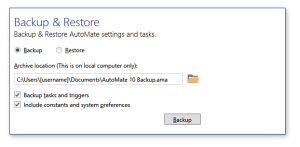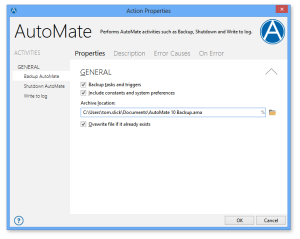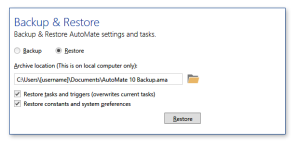Backing Up & Restoring Automate Data |
Overview
The Backup and Restore features in Automate are capable of saving remote backup copies of managed tasks, triggers, and system data onto an Automate archive (.ama) file. This file may later be used to restore lost data in the case of a catastrophic event, accidental deletion or corruption of data. Automate's Backup feature is capable of saving backup copies of managed tasks, triggers, and system preferences onto an Automate Archive (.ama) file. This file may later be used to restore lost data in the case of hard drive failure, accidental deletion, data corruption or other catastrophic event. It can also be used to populate a new Automate installation with already constructed tasks and triggers or restore data after an upgrade. Backups and restores can be performed manually. In addition, a Backup Automate activity can be used to perform automated backups.
Manual Backup
Backing up or restoring data can be performed manually from the Task Administrator by way of System Settings - Backup & Restore . With Automate Premium, remote Runtime installations can be backed up manually as well. You simply need to connect to the desired Runtime component and select Options > System Settings > Backup & Restore. For more details, see Remote Backup & Restore.
To Manually Backup Local Automate Data
-
From the Task Administrator, select Options> System Settings, and then double-click Backup & Restore. The Backup & Restore page appears (as shown below).
-
Toggle the Backup option.
-
In the parameter labeled Archive location, enter the path and file name in which to save the Automate Archive (.ama) file. Press the Folder icon to open an Explorer window to navigate to the desired location or you can save to the default archive location which is pre-defined (C:\Users\{Username}\Documents\AutoMateBackup.ama).
-
There are two preferences to select from when backing up Automate data:
-
Backup tasks and triggers - If enabled, all managed tasks that are located in your Default Managed Tasks Location (as specified under Options > System Settings > Task Service Preferences) and any triggers currently attached to those tasks will be included in the backup. This option is enabled by default.
-
Include constants and system preferences - If enabled, all global system preferences and existing constants (specified under Options > System Settings > Constants) will be included in the backup. This option is disabled by default. In order to perform a complete backup of imperative data, make certain to enable this option as well.
-
-
After entering your preferences, click the Backup button. Automate will then backup the specified settings into a compressed file with a .ama extension.
Automated Backup
For further optimization, backups can also be performed in an automated fashion using the Backup Automate activity. With this capability, you can easily create a non-complex task that contains a single step that backs up your Automate data and attach a Schedule trigger to execute the task on a set schedule. The task can also be deployed to one or more remote Runtime installations as a means to perform remote backups.
To Perform Automated Backup:
-
From the Task Builder's Actions panel, expand the Automate action, and then drag the Backup Automate activity to the Steps panel. This should open the properties dialog.
-
On the General properties, (illustrated below), select the desired check boxes to specify the type of backup. The available options are:
- Backup tasks and triggers – If enabled, all managed tasks that are located in your Default Managed Tasks Location (as specified under Options > System Settings > Task Service Preferences) and any triggers currently attached to those tasks will be included in the backup. This option is enabled by default.
- Include constants and system preferences - If enabled, all global system preferences and existing constants (specified under Options > System Settings > Constants) will be included in the backup. This option is disabled by default. In order to perform a complete backup of imperative data, make certain to enable this option.
-
In the Archive location field, enter the path and file name in which to save the archive file. Press the Folder icon to navigate to the desired location. Note that when editing remote preferences that specify a drive location (such as the Archive location field, the Explorer window that comes into view reflects the local computer's drive. If entering a network location, make certain to specify the path by way of UNC (Universal Naming Convention) format as opposed to a mapped drive. For example X:\foldername\filename.amashould be \\servername\foldername\filename.ama. This is because mapped drives are created and/or connected when the user is logged on but are not accessible when the computer is in a logged off state. If the task executes in the background while the computer is logged off, it will fail to recognize the mapped drive. However, locations specified in UNC format are accessible even when the computer is logged off.
-
To overwrite any backup file that currently exists in the destination, make sure to enable the option Overwrite file if it already exists.
-
After entering all preferences, click OK to save and close the properties dialog.
- Add the appropriate trigger to allow the task to run automatically.
Restore A Backup
To Restore a Backup:
-
From the Task Administrator, navigate to the System menu, and then select Restore. A dialog box titled Restore Automate from backup appears as shown below.
-
In the parameter labeled Archive Location, enter the path and file name of the Automate archive (AMA) file in which to restore. The default archive location is C:\Users\{Username}\Documents\AutoMateBackup.ama.
-
There are two options to select from when restoring a backup:
-
Restore tasks and triggers – If enabled, all managed tasks and any triggers currently attached to them will be restored. This option is enabled by default.
-
Restore constants and system preferences - If enabled, all global system preferences and constants will be restored. This option is disabled by default.
-
-
In the Archive location parameter, enter the path and file name to the Automate Archive (.ama) file you wish to restore.
-
Click Restore to complete the process.


